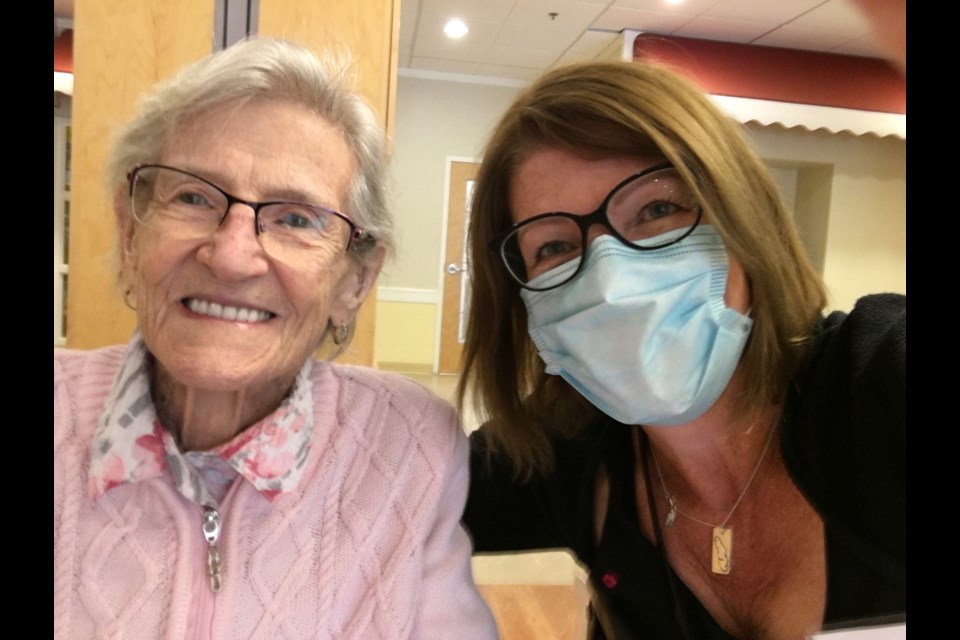Only a day after families at Mount St. Mary’s long-term care home were told they could visit a loved one, the facility had to reverse course.
“This is so sad for everyone, tragic beyond words,” said Brenda Brophy, 55, of Victoria. “If staff can be around this vulnerable population, how are families a bigger risk? I’d argue we are less of a risk.”
Brophy hadn’t seen her mother, who turned 100 on April 5, for almost three months. On Monday, Brophy and her mother were reunited during a 45-minute visit after the Victoria care home started allowing visits.
The next day, Mount St. Mary chief executive officer Sara John Fowler amended the four-day-old visitor guidelines.
Her letter says as a result of “more information from our public health officials regarding ‘essential visits’ in long-term care homes … our policies and procedures around visiting Mount St. Mary must be amended.”
Brophy had barely got over the excitement of the letter she received on June 5: “We recognize that our residents and our family members are yearning for visits,” it said.
“We have determined that family visits with our residents are essential.”
Protocols for visiting included use of personal protective equipment including surgical masks provided by Mount St. Mary, screening for symptoms, one visitor at any one time per resident, strict visitor time slots, physical-distancing provisions, and restrictions on movement between buildings.
Fowler said Tuesday that new information about the pandemic comes in daily from public-health bodies. Revised criteria for essential visitors in late May seemed to allow for facilities to have a bigger say on what was deemed to be an essential visit.
On May 20, the B.C. Centre for Disease Control posted guidance advising long-term care facilities to restrict visitors to essential visits.
Its examples of essential visits include visits for compassionate care for end of life and critical illness, and visits considered paramount to resident care and well-being, such as assistance with feeding or mobility.
“This restriction to essential visits allows health authorities and operators some implementation flexibility to ensure vital resident needs can continue to be met, while still applying a serious lens,” the guidelines say.
Some operators found the wording open to interpretation.
“And so that’s what we were going with, but subsequent to that we learned that the criteria … were more restrictive in terms of what essential visits are,” Fowler said.
Of the 10 visits scheduled at Mount St. Mary’s this week, about five will meet the criteria, she said.
Fowler said families whose visits were “postponed” have been understanding. “I know people are disappointed, of course they are.”
Brophy had started an online petition asking for visits to be allowed at Island seniors’ homes. Others have written to the provincial health officer asking for the same.
Brophy’s mother has dementia, which Brophy calls a relentless and unforgiving degenerative disease that waits for no one “and certainly not for a vaccine.”
“I’m so tired of the fight, but I can’t give up,” she said.
B.C. seniors advocate Isobel Mackenzie said she believes that everyone, including provincial health officer Dr. Bonnie Henry, understands the hardship created by visitor restrictions and believes “something a little better” than the current interpretation of essential visitors is needed.
Over the next while, the doors to visits at long-term care facilities will likely open a little but they won’t be thrown open because of the risk of transmission and serious threat that the virus poses to seniors, Mackenzie said.
Henry said long-term care homes are subject to both local and provincial orders, and it has always been decided on a regional basis what essential family members are needed to provide care to people in long-term care.
“We will have a provincial policy for general visiting with the appropriate caveats in place,” Henry said.
The caveats will protect residents, workers and those visitors who are sometimes vulnerable themselves because of age or health status, she said.
“That will be coming on a provincial basis and we will be doing this in a co-ordinated way that supports all families and all long-term care homes,” Henry said.



